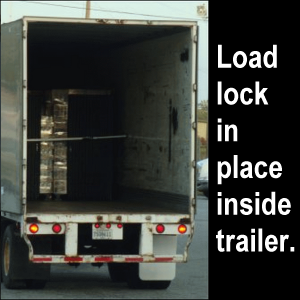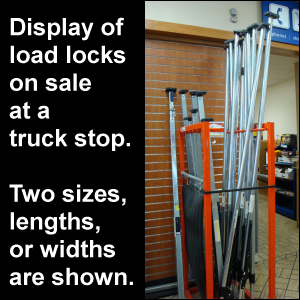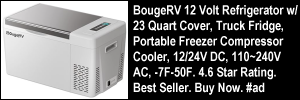As the name implies, load locks are devices that are designed to keep loads “locked” into place inside a trailer.
 These devices differ from load straps because the former are rigid, firm, and stick-like.
These devices differ from load straps because the former are rigid, firm, and stick-like.
The photo here shows a load lock in place in a trailer just behind a stack of freight.
How to Use Load Locks
All load locks are meant to be
- placed with the lever in the “open” position between the side walls of a trailer,
- extended to where both ends are firmly touching their respective side wall, and
- then the lever is pulled to a “closed” position, lengthening the device a little more so that it fits snugly between the walls.
Sometimes in transit, road vibrations can cause the side walls of a trailer to flex such that a load lock no longer snugly fits between the trailer’s side walls, and thus the lock falls to the floor.
I once attended a trucking show during which a manufacturer claimed that their devices were so good that a man could literally hang with his full weight from the device without it falling.
He then demonstrated that scenario — and it was impressive.
Whether or not that worked every time, I don’t know.
Let the buyer beware.
Differences from Load Straps and in Sizes
 Load locks are different from load straps, the latter of which is meant to be attached to the side walls in special locations.
Load locks are different from load straps, the latter of which is meant to be attached to the side walls in special locations.
The problem is that the “special locations” may not be everywhere along the trailer’s walls — horizontally or vertically — where support is needed.
Be aware that load locks come in different sizes, lengths, or widths.
The photo shown here — taken at a truck stop — shows two different lengths.
You will need to know the interior dimensions of your trailer before you purchase a load lock.
Problems Load Locks Can’t Fix
Please understand that load locks can only go so far in preventing freight from moving around.
Furthermore, securing a load from the back end will never be able to undo a sloppy loading job by a shipper!
We documented on our Avoiding Overweight Fines page a real life example we experienced.
We were accused of slamming on the brakes of our truck and shifting the freight on board, when it was obvious that someone had packed the truck poorly.
Please note that there may be times when more than one load lock is needed in a trailer:
- either one more in the nose and one toward the tail;
- or one “upper” and one “lower” in the same location front to back.
Use your own best judgment on that.
There may be other problems that these locking devices can’t fix.
Leaving Load Locks Behind?
What happens if you have to leave load locks inside a trailer that you have to drop somewhere?
We don’t know how owner-operators work that, but as far as company drivers are concerned, our experience has been that if the trailer gets dropped, the locking devices go with it.
If you’re a company driver, make sure that you communicate that to your driver manager.
Also, if you purchase one or more load locks (such as at a truck stop), always make sure that you get a receipt so that you can get reimbursed.
Some trucking companies have a “P.O.” (Purchase Order) system in place.
If you submit a receipt under a P.O., be sure to mark that down in your load notebook so that when your settlement comes in, you can check to make sure that you were compensated.
Depending on how you set up your finances, you may buy a load lock with cash from your truck fund.
Here’s also another way to buy them, through Amazon.com, with whom we have an affiliate relationship:
Preventing Theft
Some truckers store their unused load locks in a rack behind their tractors.
When the rack is not locked, anyone can come along and lift one or more devices right out!
So, please make sure that you put the lock on the rack and keep the key on your key ring.
Last point: Just because you have a load lock inside your trailer does not mean that you shouldn’t put a lock on the trailer doors to prevent the theft of part or all of the load.
Just saying.
If this post has been valuable to you — or if we’ve missed something that needs to be added — please contact us to let us know.









